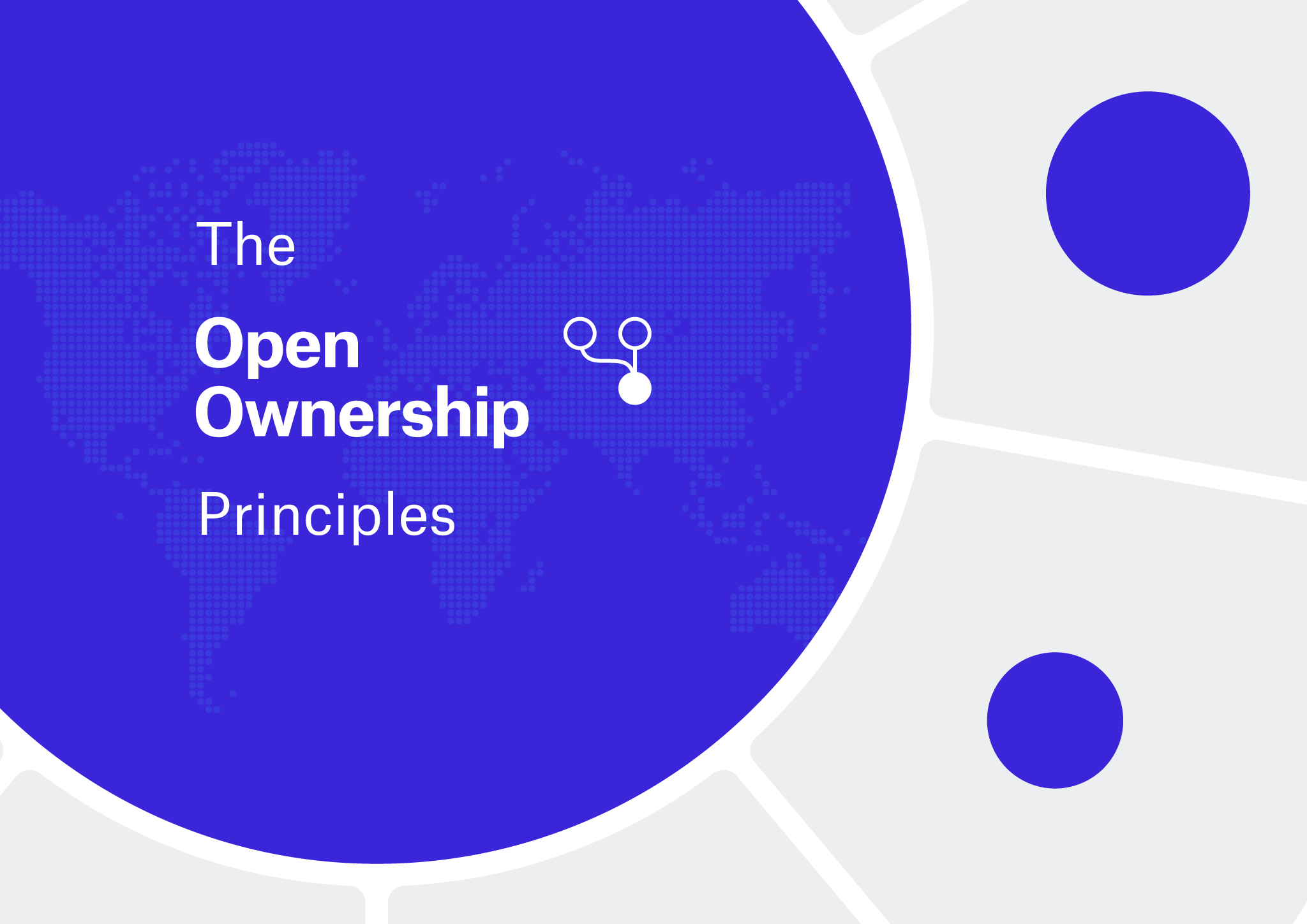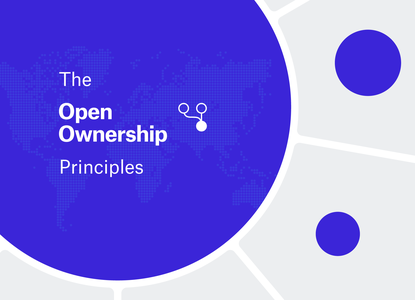Publication of revised Open Ownership Principles

Open Ownership has published an updated version of its Principles for effective beneficial ownership disclosure in January 2023.
The Open Ownership (OO) Principles are a framework for considering the elements that influence whether the implementation of beneficial ownership transparency (BOT) reforms will lead to effective beneficial ownership (BO) disclosure. Implemented in full, the Principles help ensure that a jurisdiction can achieve the widest range of policy aims. However, for jurisdictions pursuing only specific aims, the Principles also provide a framework for thinking through those reforms.
Given that BOT is a developing policy area, the OO Principles are a living framework offering guidance based on the characteristics of implementation that are most likely to generate high quality, reliable data that maximises usability for all potential users. OO’s policy and research team are responsible for refining and updating the Principles on a regular basis. We do so based on the collective knowledge and experience the organisation gains through its work with implementers, the latest research by OO and others, and relevant shifts in the global policy landscape. Historical versions and summaries of changes are available on our website.
As the policy area of beneficial ownership transparency continues to evolve, Open Ownership is committed to making future revisions based on an iterative and evidence-based approach, to ensure the framework remains current and well-placed to lead to actionable and usable data. We welcome suggestions, feedback, and comments on the contents of this and future updates. These can be sent to [email protected].
Summary of changes
The new version of the OO Principles includes updates that are both cross-cutting and specific to each of the nine principles.
Cross-cutting changes
We have expanded the focus from companies to corporate vehicles more broadly. Following our early work on the BOT of trusts and the evolution of the beneficial ownership of trusts policy space – such as the forthcoming revisions of Financial Action Task Force (FATF) Recommendation 25 on legal arrangements – we are increasingly providing implementation support for BOT of trusts, for example in South Africa and Namibia. The broadening of the Principles to focus on corporate vehicles is also informed by discussions on the legislative framework for beneficial ownership of legal forms such as Limited Partnerships, for example in the United Kingdom.
The updates also account for two important milestones in the international policy landscape for BOT reform in 2022. The first is the March 2022 revision of Recommendation 24 in the FATF Standard, which raised global standards on BOT and included a significant shift, effectively mandating central beneficial ownership registers. The second is the judgement by the Court of Justice of the European Union of November 2022 on public access to beneficial ownership in the EU, which underlined the need to appropriately balance transparency with privacy. While this need was already articulated in the previous iteration, it is now spelled out more clearly across different principles based on the experience in jurisdictions that have successfully balanced transparency with privacy while maintaining public access (e.g. Armenia, Nigeria, Slovakia, and the United Kingdom).
Changes to individual principles
Definition
Updates to this principle account more explicitly for variations in how ownership and control is exercised within different corporate vehicles and through relationships between beneficial owners. The updated principle notes that legislation should specify what the definition means when applied to certain corporate vehicles, such as legal arrangements. It also addresses criteria for joint ownership, and cases where no individual meets the definition of a beneficial owner. Finally, it points to the need to give special consideration to minors and other legally incapable individuals within the context of the legal system.
Coverage
Updates to this principle draw on Open Ownership’s forthcoming policy briefing (spring 2023) on coverage, and widen the scope of corporate vehicles and ownership forms that are recommended to be covered. The updated principle refers to all types of entities and arrangements through which an individual can exercise ownership or control of assets, including deriving benefits. This accounts for national variation in forms of corporate vehicles and their misuse, which includes, for example, entities with no separate legal personality. It also removes reference to the coverage of natural persons, which is conceptually better addressed within the Definition principle.
Detail
Updates to this principle draw on the development of Open Ownership’s forthcoming technical guidance (spring 2023) on BOT for state-owned enterprises. The updated principle includes the collection of information about individuals holding positions of control specific to state-owned enterprises (e.g. senior managing officials). It also connects the collection of information to data verification considerations, and highlights the importance of form design.
Central register
Updates seek to further clarify the role of a central beneficial ownership register in jurisdictions where there may be multiple points of collection of beneficial ownership information, for example for extractives or public procurement. The updated principle clarifies the role of the central register as an authoritative source of beneficial ownership information, with a designated responsible body. It also emphasises that the centralisation of information in a register is more about functionality (e.g. providing a common infrastructure for business processes, managing data quality, and facilitating access to data users in a standardised way) than about the technical infrastructure that is used to achieve this.
Access
Access should be rooted in a jurisdiction’s intended policy aims and legal justification, and the principle recognises that there are variable needs among different data user groups. Updates provide for a broader view of data access to also cover best practice in the access of information by internal government users. The updated principle still clearly recommends a wide scope of access: all user groups whose access is justified to meet specific policy aims should have direct and rapid access on a per-record basis and as bulk data. This includes the public, who should have access to a clearly defined subset of usable data, free of charge. The importance of establishing a broad purpose and legal basis for publication, in line with privacy and data protection legislation, is emphasised. The mitigation of potential risks associated with publication is key to this, as well as adhering to data protection principles of data minimisation for various user groups, and proportionality.
Structured data
Updates draw from our policy briefing outlining the key benefits of collecting, storing, and publishing structured beneficial ownership data, and technical guidance which discuss auditable data as data that is easy to access, interpret, and check. The principle includes more specific recommendations about identification and availability of both current and historical data. For instance, data should allow for the identification of all parties and describe the full range of relationships that can exist in a beneficial ownership declaration, using clear identifiers. Identifiers can also facilitate connections between datasets. The updated principle notes several ways in which data can be made available and auditable, for example in a browsable format and on a per-record basis.
The updates note that in order to create an auditable record, additional information needs to be captured. For example, clear dates and reasons for updates should be included as part of the record. The updated principle also allows for corrections to the historical records and redaction in cases where published information is subsequently exempted from publication under a protection regime.
Verification
Updates to this principle are minimal. Based on our work on verification in EU member states, as part of the Network of Experts on Beneficial Ownership Transparency (NEBOT), we have expanded the principle to include wording on the responsible agency’s legal responsibility, mandate, and powers to verify data. While not a substantive change, the revised principle aligns its language with that of the new FATF Recommendation 24 on verification of the status of the beneficial owner, referring to the verification of how an individual is claimed to exercise ownership and control over a corporate vehicle.
Up-to-date and historical records
This principle has been narrowed in scope to focus on events that trigger a legal requirement to declare beneficial ownership. The concept of auditability has been expanded on and moved to the Structured data principle.
Sanctions and enforcement
Updates offer greater clarity and precision about what makes sanctions effective, proportionate, and dissuasive, drawing from our 2022 policy briefing documenting various approaches jurisdictions are taking and emerging good practice. The updated principle clarifies that financial sanctions should be set high enough not to be seen as a cost of doing business. It also describes measures to effectively operationalise sanctions and their enforcement, such as clearly determining which authority is responsible to enforce sanctions, automating sanctions, and publishing information on noncompliance.
Read the updated version of the OO Principles.
Publication type
News article
Sections
Implementation
